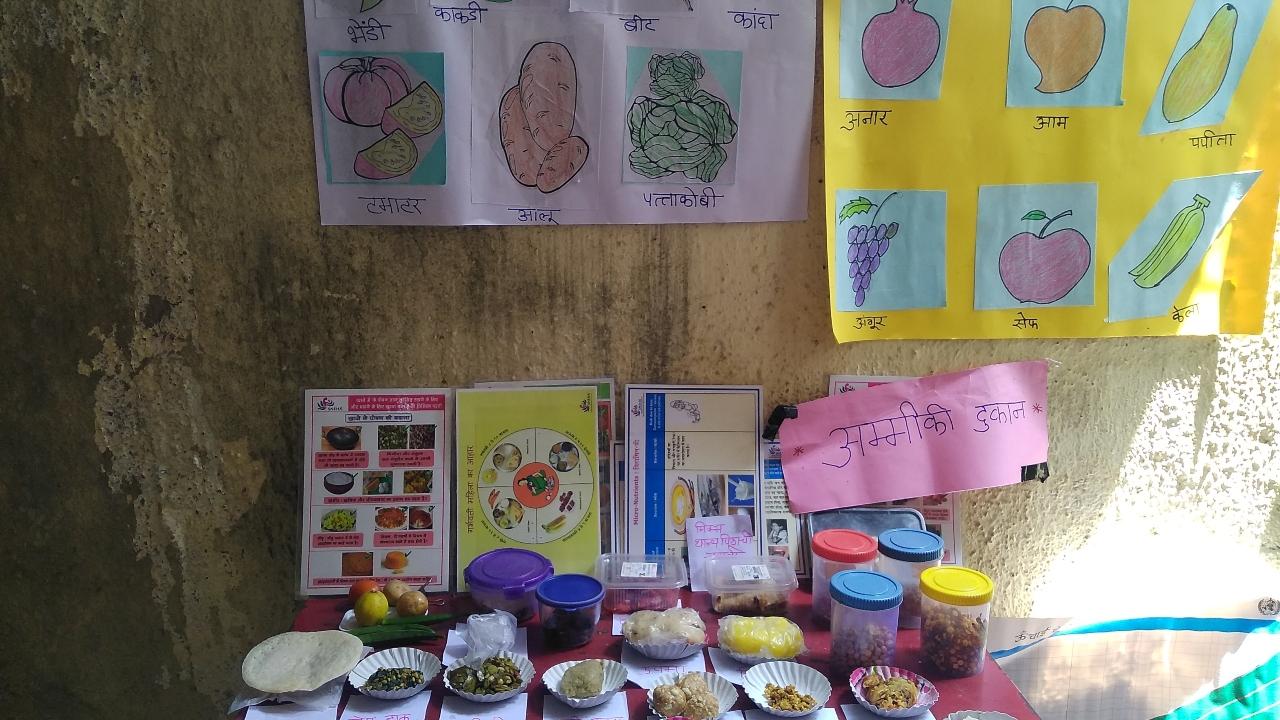High prices of fruits and vegetables, and parents not having enough time to feed their children, results in the consumption of easily available, low-cost unhealthy foods such as wafers, vada pav, fried food, Chinese bhel, toast, butter, khari and instant noodles among kids

Needa Shaikh with her mother (L) and cousin Samira Shaikh. Pic/Anagha Sawant
Living in the narrow bylanes of Dharavi, 18-month-old Needa Shaikh has seen her four-year-old cousin Samira eat wafers and fried pop rings every day. Looking at her own cousins and other kids in the neighbourhood, it wasn’t too long before Needa too started demanding the same. Her mother Praveen Nadim Shaikh says, "Earlier we used to buy Rs 5 wafers and pop rings rather than see her cry for them. I never realised that it could be harmful to her. I was not aware of the right diet and the best kinds of food required for her good health.”
ADVERTISEMENT
In November last year, a community organiser from a local NGO informed Praveen that her daughter was suffering from Moderate Acute Malnutrition (MAM) as she weighed 6.5 kg. Like Needa, many other young children in Mumbai’s slum areas of Dharavi, Wadala and Mankhurd are reportedly underweight and malnourished as they consume unhealthy, low-cost foods due to a lack of awareness among parents.
A survey released last week by SNEHA, a non-profit working in the field of malnourishment across the slums of Mumbai, shows over 83 per cent of infants, aged six months to 23 months, in these areas are consuming unhealthy, low-cost food. The cross-sectional survey, released on World Health Day this year, was carried out in Mankhurd, Wadala and Dharavi slum areas with a sample size of 1,562. It reveals that the foods commonly consumed by infants include wafers, vada pav, fried foods, Chinese bhel, toast, butter, khari, instant noodles and sugary foods, which are available at affordable prices. More than half the toddlers---52 per cent in Wadala, 61 per cent in Dharavi and 69 per cent in Mankhurd---did not consume fruits and vegetables.
According to the survey, mothers fed their children unhealthy food primarily because of reasons such as high prices of fruits and vegetables, and parents not having enough time to feed the child. The survey further said 67 per cent of mothers from Wadala, 62 per cent from Dharavi and 67 per cent from Mankhurd introduced solid or semi-solid food to infants after six months of age. As the focus remains on breastfeeding infants up to six months of age, what is being introduced as semi-solid and solid food from the age of six months to two years is getting neglected, the survey said.

Awareness drive at the local health centre about kind of food to avoided by children. Pic/Anagha Sawant
While it is commonly believed that children from wealthier households are affected more by junk food, the study revealed that a lack of adequate Infant Young Child Feeding (IYCF) practices results in poorer households also falling for unhealthy food consumption.
Anagha Waingankar, Associate Programme Director at SNEHA, says, “Many first-time mothers are not aware of the right kind of nutrition needed for their children. So it is important to make them understand that the same amount of money used to buy unhealthy food can also get food with nutritional value.” She adds, “During community organisers’ house visits, if we find malnourished kids, we give counselling to the parents, refer them to the nearest NRRTC at Urban Health Centre, and schedule weekly or monthly visits to follow-up on the children’s health. In case of Severe Acute Malnutrition cases in Dharavi, the child is referred to Sion Hospital’s paediatric department.”
Chart prepared by health workers in Dharavi to educate mothers and children about healthy food. Pic/Anagha Sawant
Speaking about the effect of poor nutrition on a child’s health, a community organiser from Dharavi, Farhanaz Sarfaraz Shaikh, says, “Poor nutrition during the first 1000 days of a child’s life leads to lifelong consequences, which include lesser IQ and increased chances of illnesses.” Waingankar adds, “We are working on different initiatives with an aim to increase awareness about nutrition essential for a child’s growth in the first 1000 days of their life. Through our activities, we advocate a healthier lifestyle to eliminate the ill-effects of unhealthy eating practices in families and communities.”
 Subscribe today by clicking the link and stay updated with the latest news!" Click here!
Subscribe today by clicking the link and stay updated with the latest news!" Click here!







